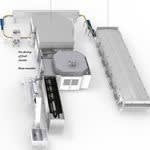 A new trend is seeing whole fruit cells and fruit chunks admixed to premium juice or upmarket milk-based mixed beverages.
A new trend is seeing whole fruit cells and fruit chunks admixed to premium juice or upmarket milk-based mixed beverages.For the process engineering required to handle these fruit preparations featuring sacs, fibres, fruit chunks or pulp, Krones AG, Neutraubling, Germany, has developed a twin-flow process with separated product flows.
In this twin-flow process, the product flows are handled separately, so as to rigorously minimise the thermal loading on the end-product. The principal quantity, the juice, can be pasteurised in the conventional way using plate heat exchangers (on request, of course, also with shell-and-tube heat exchangers, with concomitantly reduced wear and tear). The crucial factor is that in the juice flow more affordable standard components can be used, like centrifugal pumps, valves with a standard stroke, etc. The fruit preparation, by contrast, mixed with a small quantity of juice, is always treated in specially dimensioned shell-and-tube heat exchangers, which enables the cost-intensive fruit preparation to be very gently pasteurised. Product losses and damage to the valuable fruit chunks are significantly reduced. In its twin-flow concept, Krones rigorously deploys deaeration only for the juice, but not for the fruit preparation.
By developing these sophisticated process-engineering systems, Krones has put in place the requisite preconditions for cost-efficiently and gently preparing fruit preparations while ensuring minimised damage rates. In this concept, the thermally treated fruit preparation is then first pre-dosed into the containers using a pre-filler, after which the main filler adds the flash-pasteurised juice at the same temperature. A complete, holistically conceived system has thus been designed for producing and bottling high-quality premium juices or also milk-based mixed drinks with a fruit content.



